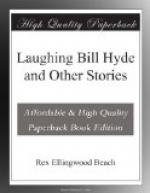Jackson Wylie, Sr., did not really come to until he had reached the street; even then he did not know whether he had come down the elevator or through the mail-chute. Of one thing only was he certain: he was due to retire in favor of his son. He told himself that he needed a trip through the Holy Land with a guardian and a nursing-bottle; then he paused on the curb and stamped on his corn for a second time.
“Oh, what an idiot I am!” he cried, savagely. “I could have gotten L1,600,000 to start with, but—by gad, Sir Thomas is the coldest-blooded thing I ever went against! I—I can’t help but admire him.”
Having shown a deplorable lack of foresight, Mr. Wylie determined to make up for it by an ample display of hindsight. If the profits on the job were not to be so large as they might have been, he would at least make certain of them by obeying instructions to the letter. In accordance with this determination, he made out the bid himself, and he mailed it with his own hand that very afternoon. He put three blue stamps on the envelope, although it required but two. Then he called up an automobile agency and ordered a foreign town-car his wife had admired. He decided that she and the girls might go to Paris for the fall shopping—he might even go with them, in view of that morning’s episode.
For ten days he stood the pressure, then on the morning of the twenty-fourth he called his confreres into the directors’ room, that same room in which young Hanford had made his talk a number of years before. Inasmuch as it was too late now for a disclosure to affect the opening of the bids in London, he felt absolved from his promise to Sir Thomas.
“Gentlemen, I have the honor to inform you,” he began, pompously, “that the Barrata Bridge is ours! We have the greatest structural steel job of the decade.” His chest swelled with justifiable pride.
“How? When? What do you mean?” they cried.
He told them of his mysterious but fruitful interview at the Waldorf ten days previously, enjoying their expressions of amazement to the full; then he explained in considerable detail the difficulties he had surmounted in securing such liberal figures from Sir Thomas.
“We were ready to take the contract for L1,300,000, as you will remember, but by the exercise of some diplomacy”—he coughed modestly—“I may say, by the display of some firmness and independence, I succeeded in securing a clean profit of $500,000 over what we had expected.” He accepted, with becoming diffidence, the congratulations which were showered upon him. Of course, the news created a sensation, but it was as nothing to the sensation that followed upon the receipt of a cablegram the next day which read:
ATWYLIE,
Newark, New Jersey.
Terrible mistake somewhere. We lost. Am coming home to-day.
Mr. Jackson Wylie, Sr., also went home that day—by carriage, for, after raving wildly of treachery, after cursing the name of some English nobleman, unknown to most of the office force, he collapsed, throwing his employees into much confusion. There were rumors of an apoplectic stroke; some one telephoned for a physician; but the president of the Atlantic Bridge Company only howled at the latter when he arrived.




